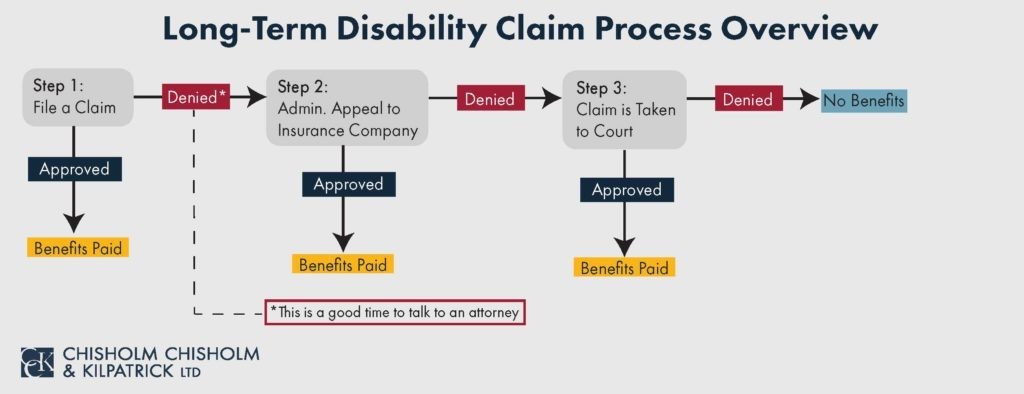Getting Long-Term Disability (LTD) Benefits for Peripheral Neuropathy

The process for getting long-term disability (LTD) benefits for Peripheral Neuropathy is not always as easy as filing a claim and collecting your benefits. Unfortunately, insurance companies are powerful entities, often driven by their own financial interests, and wrongful denials are all too common.
Coping with a disabling condition can be stressful enough without also having to fight with an insurance company for the benefits to which you are rightfully entitled. The attorneys and professionals at Chisholm Chisholm & Kilpatrick are knowledgeable and experienced in handling ERISA and non-ERISA LTD claims and are prepared to fight the insurance company on your behalf. Contact us now at 401-331-6300 for a FREE consultation to see if we are able to assist you.
Understanding Peripheral Neuropathy
Peripheral neuropathy is a condition that occurs when nerves outside of the brain and spinal cord are damaged. Peripheral neuropathy can be caused by traumatic injury, infections, autoimmune diseases, and exposure to toxins, or can be inherited from family members. However, the most common cause of neuropathy is diabetes. Additionally, although peripheral neuropathy may only affect one nerve and therefore only one area of the body, most people who have been diagnosed with peripheral neuropathy will have damage to multiple nerves.
The symptoms of peripheral neuropathy vary depending on which nerves are damaged and thus which area of the body is affected. However, the most common areas in which people experience neuropathy symptoms is their hands and feet. Typically, those with neuropathy in their hands and feet will experience sharp, throbbing, or burning pain, as well as numbness, tingling, and weakness, in the affected areas. Many people also experience extreme sensitivity to touch and cannot tolerate certain sensations like taking a shower or being under a blanket. Additionally, since those who suffer from neuropathy do not experience normal sensations in the affected areas, they are more susceptible to injury, infection, and falls.
In order to diagnose you with peripheral neuropathy, your doctor will likely obtain your full medical history and perform a neurological exam in order to test your reflexes, muscle strength, and ability to feel certain sensations. Your doctor may also order additional testing, such as a nerve function test called an electromyography, or EMG, as well as a nerve conduction study. These tests measure and record your nerves’ response to electrical currents and activity in your muscles. Once diagnosed with peripheral neuropathy, your doctor may prescribe you pain medication and/or topical treatments in order to manage your symptoms. Your doctor may also recommend TENS (Transcutaneous Electrical Nerve Stimulation) unit treatments and physical therapy in an attempt to strengthen your muscles. You may also be advised to modify some of your daily activities, which can often lead to modifications of your work activity. For example, you may be advised to spend less time typing and writing if you experience neuropathy symptoms in your hands, or, if you experience neuropathy in your feet, you may be advised to use a cane and avoid activities that could put you at an increased risk of falling.
CCK Understands Peripheral Neuropathy Disability Claims
We know that often, peripheral neuropathy does not improve and can often worsen over time. This condition can severely impact your ability to work reliably and consistently. Not only does your neuropathy cause you to experience pain and weakness in your hands and/or feet, but there could also be accompanying cognitive problems, such as memory impairment, lack of focus and concentration, and chronic fatigue that are also affecting your ability to work.
Your insurance company may not completely understand how significantly peripheral neuropathy affects your ability to work. We do. At CCK, we have experience assisting professionals with peripheral neuropathy at all stages of their LTD claims.
If your claim has been denied, CCK can help you fight for the LTD benefits to which you are rightfully entitled. Our team will analyze the insurance company’s denial letter and claim file, as well as your policy and other plan-governing documents, and determine the best appeal strategy based on the errors the insurance company might have made while handling your claim. We also use our vast knowledge and experience with ERISA, the U.S. Department of Labor Regulations, and various policy language to draft the best appeal for your case.
Once the denial analysis is complete, we determine the appeal strategy. Then, we gather supportive evidence to prove that you meet the definition of disability and are entitled to benefits. We start by gathering your medical records, including any diagnostic testing you may have undergone, and get reports from your treating providers. Some doctors prefer not to get involved in disability claims because they are busy with the demands of their medical practice. As a client, we will typically advise you of the importance of having strong communication with your doctors and informing them of your symptoms and how they impact your ability to function. If your treating doctors are not willing to write reports or complete forms on your behalf, we are able to gather outside expert opinions to attest to your disability.
Preparing a strong appeal is particularly important in ERISA-governed LTD claims because, in most cases, the administrative appeal is the last chance the claimant has to enter supportive evidence into the record before the Court stage of the appeal process. We gather all the evidence, develop our arguments, and write an appeal that strategically and clearly explains why our clients meet their policy’s definition of disability.
Long-Term Disability Claim Denied?
Contact Chisholm Chisholm & Kilpatrick now at 401-331-6300 for a FREE consultation to determine if we are able to assist you with your LTD claim or appeal for peripheral neuropathy.
